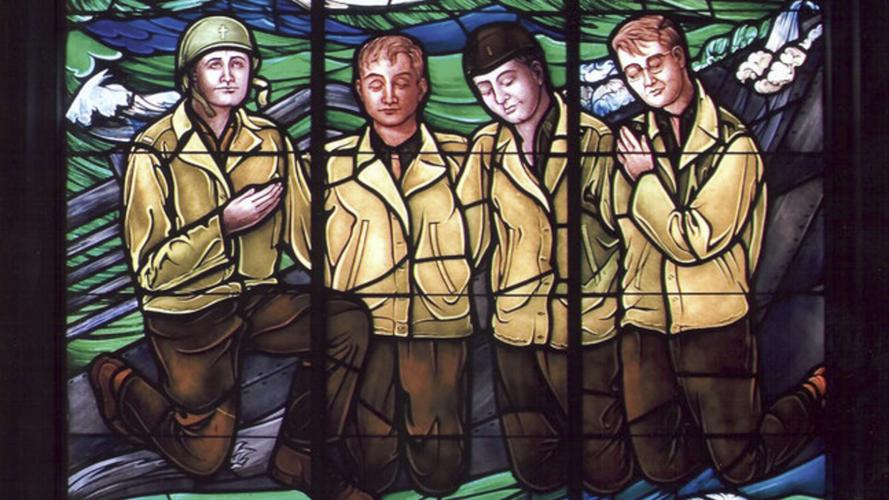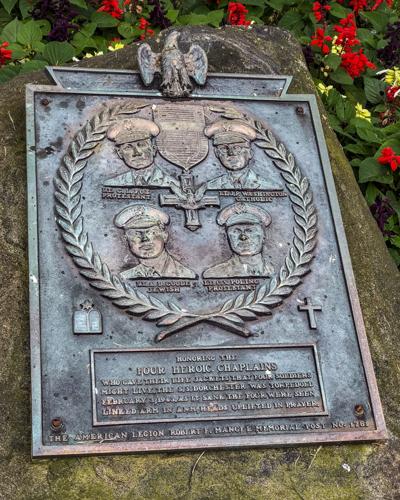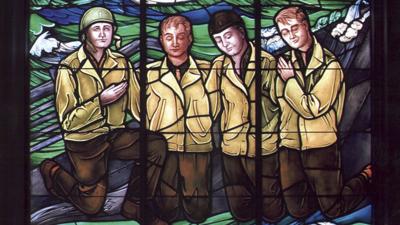LOUISVILLE, Ky. (WDRB) -- Most mornings, Coffee with Crawford is about the little things — a ballgame, a buzzer-beater, a moment you might've missed.
But this morning, on Memorial Day, it's about the biggest thing.
A story my father told from the pages of Kentucky's biggest newspaper — and one I've found myself telling, too.
It was about, among others, a high school football player. One of the little guys. About 5-foot-7, maybe 135 pounds soaking wet. His name was Clark Poling.
He made the team, even started a few games at defensive back. But injuries cut his football days short. And that might've been the end of it — a small story in a small life.
Only it wasn't.
Poling became a minister, like his father before him. He had his doubts — about himself, about the faith — but he kept showing up. He went to Yale Divinity School. Married. Had a son. And when World War II broke out, he enlisted.

The Four Chaplains plaque near the paddock of Belmont Park in Elmont, N.J.
He didn't want a safe post behind a pulpit. He wanted to go where the danger was. His father had served as a chaplain in World War I and warned him — chaplains had one of the highest casualty rates in the war. That was all he needed to hear.
He joined the Chaplain Corps and went to training at Harvard. That's where he met three other chaplains — George Fox, a Methodist minister and decorated World War I medic; Alexander Goode, a rabbi with a doctorate from Johns Hopkins; and John Washington, a Catholic priest from Jersey City who studied at Seton Hall.
Four different men, four different faiths. But they were a team. Soldiers said watching them together was like watching a football huddle.
They shipped out together aboard the Dorchester, a passenger steamship-turned troop transport headed across the North Atlantic. And on Feb. 3, 1943, they were in icy waters when a German torpedo struck the ship.
Four men from different faiths, with different accents and answers to life's biggest questions — but in the end, not one of those differences mattered. In fact, maybe that's what made their sacrifice even more powerful — and distinctly American. They stood together, not in spite of what set them apart, but because of their common mission.
The four chaplains moved through the chaos, handing out life jackets, helping men into lifeboats. They stayed calm. They prayed — each in his own language, his own faith.
And when the life jackets ran out, each of them took off his own, and gave it away.
A survivor named Grady Clark remembered looking back from the water:
"The flares had lighted everything. The bow came up high and she slid under. The last thing I saw, the Four Chaplains were up there praying for the safety of the men. They had done everything they could. I did not see them again."
Some said the last image was of them, arm in arm, as the ship slipped under.
"It was," said John Ladd, another survivor who witnessed their selfless act, "the finest thing I have seen or hope to see this side of heaven."
They were posthumously awarded the Purple Heart and Distinguished Service Cross. Congress created the Four Chaplains Medal, which has only been awarded once — to their families. Their story lives on in Chapel of the Four Chaplains at Grace Baptist Church in Philadelphia and was commemorated in 1948 on a postage stamp.
The Last Drop
My dad kept one of those memories. Every year, on the anniversary of their deaths, a retired Louisville jeweler and bookstore owner named Don Roth would call and remind him. One year, Roth wrote to me. He died in 2012. But I haven't forgotten his reminders.
You can find tributes to these four heroes across the country — a stained-glass window at the Pentagon, plaques in churches and VFW halls, and even one that once stood at Belmont Park before the racetrack closed. Their story is still out there, if you know where to look.
Memorial Day means a lot of things to a lot of people. For me, it's stories like this. Stories we pass down. About men and women who weren't trying to be remembered — they were just trying to help. To do their job.
So this morning, I raise my coffee to them — to Clark Poling, George Fox, Alexander Goode and John Washington.
And to all those like them, who gave everything they had — not just once, but twice.
Once in service.
And once, finally, for someone else.
Copyright 2025 WDRB Media. All Rights Reserved.













